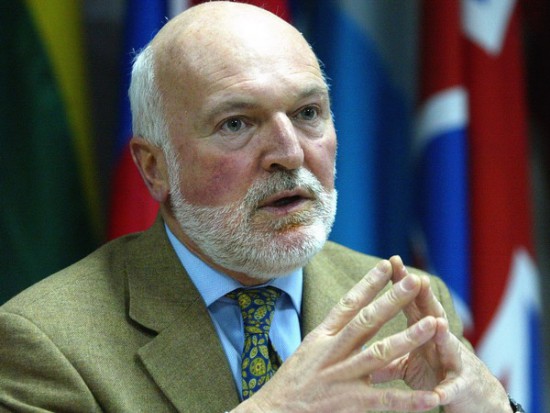Is Europe Right to Reward the Macedonian Government?
By linking the ‘conditional’ recommendation for accession negotiations to implementation of the EU-led agreement, the government is being rewarded for addressing a crisis for which it was largely responsible.
Ten months have passed since the revelation of a massive wiretapping scandal in Macedonia, involving alleged corruption at the highest levels of government, serious breaches of fundamental rights, as well as interference with the judiciary, the electoral process and media freedom. No one has yet been made accountable.
By far the worst crisis to hit the country since the conflict in 2001, it follows a succession of other crises that have characterised the nine years of the VMRO-DPMNE-led government, which took power in 2006, and which have contributed to a deeply polarised society governed by a climate of fear, and has gravely damaged the image of Macedonia in the eyes of the world. Despite overwhelming evidence and the voices of Prime Minister Nikola Gruevski himself and others, who are clearly identifiable on the audio tapes, Gruevski continues to deny the government’s involvement in the wiretapping, claiming that the tapes were “fabricated” by foreign intelligence services – which he has refused to name.
Meanwhile, efforts to implement the EU-brokered June/July agreement between the government and opposition continue. The opposition returned to parliament on September 1, ending its 14-month boycott. Two ministers and three deputy ministers from the opposition were appointed to the government and a Special Prosecutor was appointed with full authority to investigate the wiretapping and bring the perpetrators and all those implicated to justice. In a society governed by rules and moral standards, a credible follow-up to the results of her investigations, ensuring accountability for crimes committed, would be guaranteed.
Unfortunately, as we have seen with the content of the wiretapped conversations themselves and the uncompromising behaviour of the government, this is not the case in Macedonia. Not only has the Council of Public Prosecutors prevaricated over the appointment of the Special Prosecutor’s team and delayed the handover of important data linked to the wiretaps, but the ruling party sought to prevent their publication, and has done everything possible to undermine the spirit of the June/July agreement, warranting an unprecedented rebuke from the international community.
The latest country report from the European Commission published on November 10 uses the strongest language to criticise the government’s performance in its EU accession reform agenda. At the same time, by retaining the recommendation to open negotiations, albeit one conditional on implementation of the political agreement, the Commission is rewarding the government for “progress made so far in the implementation of the June/July political agreement”. Whether this is the right approach to bring the government’s reform programme back on track is questionable, when one recalls that the agreement addresses a crisis for which the government is largely responsible.
Meanwhile If the June/July agreement is to be respected, early elections are scheduled for April 24 next year. Even though the agreement provides for the Prime Minister to resign three months ahead of the elections and make way for a new government whose sole responsibility “shall be limited to the organisation of the early parliamentary elections”, what guarantee is there that he will refrain from controlling all the reins of power behind the scenes?
The tone of the ruling party remains uncompromising and defiant, and the Prime Minister unrepentant. The government has launched proceedings to obtain an international loan of half a billion euros which, if it succeeds in obtaining it, will, as in the past elections, be used to offer salary increases and other populist and economically unsustainable measures prior to the elections. The ruling party’s firm grip on the media is likely to continue regardless of whatever is concluded under the political agreement in a country which was rated no 117 out of 180 countries, next to Mali and Tajikistan, in the latest Reporters without Borders index. This is compared to its 34th place in 2009, an enormous drop in media freedom rating.
A major challenge will be preventing the ruling party from resorting once again to intimidation of the public service to guarantee votes. As highlighted in OSCE/ODIHR Election Observation Reports in past years, the ruling party has used crude intimidation tactics against the public service to secure its support. With the most bloated civil service in the Balkan region, there is unfortunately nothing but a moral conscience to prevent the ruling party from again wielding its iron fist to retain power.
In the circumstances, it is doubtful that in the short time remaining all the elements will be in place to guarantee a level playing field for an electoral process free from the irregularities that have characterised so many previous elections. Should this be the case, it will be the responsibility of the international community, in particular the EU and US, together with the OSCE, to call for a delay until such time as all the elements are effectively in place. As we have seen from past experience, legislation and regulated procedures are not enough. What is also required is a change in tone of the political discourse and a change in behaviour of the political leaders, starting with the ruling party, which continues to preach the language of confrontation.
The Special Prosecutor should be encouraged to do everything possible to speed up its investigation and launch indictments. The longer it takes, the more difficult it will be to ensure proper accountability of those responsible. In Macedonian politics, memories are short, and with a powerful propaganda machine on its side, the ruling party can easily convince people that the wiretapping was a figment of the opposition’s imagination, and not worth the time of day. It will make what is regarded as evil in democratic societies, commonplace in Macedonia. This does not do justice to the people of Macedonia who have suffered at the hands of unscrupulous politicians for far too long. The time for change is long past.
27 November 2015

